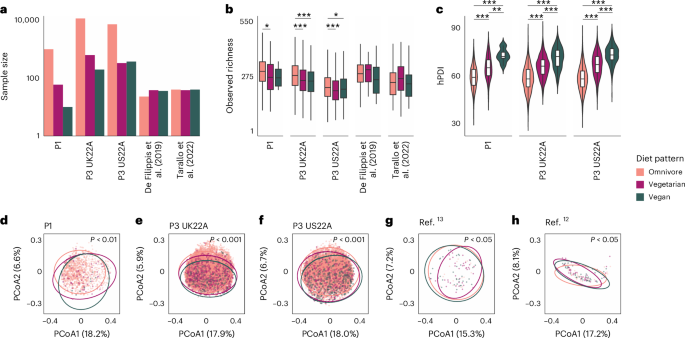As plant-based diets gain traction, interest in their impacts on the gut microbiome is growing. However, little is known about diet-pattern-specific metagenomic profiles across populations. Here we considered 21,561 individuals spanning 5 independent, multinational, human cohorts to map how differences in diet pattern (omnivore, vegetarian and vegan) are reflected in gut microbiomes. Microbial profiles distinguished these common diet patterns well (mean AUC = 0.85). Red meat was a strong driver of omnivore microbiomes, with corresponding signature microbes (for example, Ruminococcus torques, Bilophila wadsworthia and Alistipes putredinis) negatively correlated with host cardiometabolic health. Conversely, vegan signature microbes were correlated with favourable cardiometabolic markers and were enriched in omnivores consuming more plant-based foods. Diet-specific gut microbes partially overlapped with food microbiomes, especially with dairy microbes, for example, Streptococcus thermophilus, and typical soil microbes in vegans. The signatures of common western diet patterns can support future nutritional interventions and epidemiology.
News version: Gut Microbiome Signatures of Different Diets Revealed - EMJ
Epic share, thanks!!!
I didn’t know EMJ did news (ie, more plain language summaries of current research), so that’s cool too.
This is an example of slow-moving but really important science. The study didn’t investigate the ability of these tests to detect transgressions from a veg diet.
The significance of this study - which is really big for medicine and advocates of plant-based diets - is that it showed across 25k people that diet has such a strong effect on gut microbiome that you can look at a person’s microbiome and tell what their diet is with an impressive level of accuracy. It also describes how different microbiomes are associated with better and worse cardiometabolic health.
EMJ says it better than I can
This study reinforces the idea that diet patterns significantly shape gut microbiomes, which, in turn, influence overall health. It also suggests that improving dietary diversity, particularly by adding more plant-based foods to an omnivorous diet, could support better gut health and reduce disease risk. Further research is needed to explore food-to-gut transmission and the strain-level interactions between microbes and food components.
Yes, testing tools needs their own studies to show accuracy, but they did offer proof for the accuracy of the classifier:
Fig. 2: Highly accurate classification of individual diet patterns based on gut microbial features.

Average ROC curves and AUCs showing the discrimination between all pairs of the three diet patterns (omnivores vs vegetarians; omnivores vs vegans; and vegetarians vs vegans) per cohort using random forest classifiers in a hybrid cross-LODO (Methods) approach. Shaded areas correspond to 95% CIs.
Thanks. What I meant to convey is that the classifier is for 1 of 3 diets, not transgressions from 1 or more of the 3 diets
It’s about a microbial “test” to detect plant eaters, meat eaters, and dairy eaters. I’m not sure if we’ll ever get to use it to check on who’s cheating, but specialists can use it to track progress to a plant-based gut microbiome.



